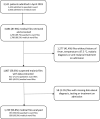Health systems readiness and quality of inpatient malaria case-management in Kano State, Nigeria
- PMID: 33126886
- PMCID: PMC7602350
- DOI: 10.1186/s12936-020-03449-5
Health systems readiness and quality of inpatient malaria case-management in Kano State, Nigeria
Abstract
Background: Nigeria was among the first African countries to adopt and implement change of treatment policy for severe malaria from quinine to artesunate. Seven years after the policy change health systems readiness and quality of inpatient malaria case-management practices were evaluated in Kano State of Nigeria.
Methods: A cross-sectional survey was undertaken in May 2019 at all public hospitals. Data collection comprised hospital assessments, interviews with inpatient health workers and data extraction from medical files for all suspected malaria patients admitted to the paediatric and medical wards in April 2019. Descriptive analyses included 22 hospitals, 154 health workers and 1,807 suspected malaria admissions analysed from malaria test and treat case-management perspective.
Results: 73% of hospitals provided malaria microscopy, 27% had rapid diagnostic tests and 23% were unable to perform any parasitological malaria diagnosis. Artemisinin-based combination therapy (ACT) was available at 96% of hospitals, artemether vials at 68% while injectable quinine and artesunate were equally stocked at 59% of hospitals. 32%, 21% and 15% of health workers had been exposed to relevant trainings, guidelines and supervision respectively. 47% of suspected malaria patients were tested while repeat testing was rare (7%). 60% of confirmed severe malaria patients were prescribed artesunate. Only 4% of admitted non-severe test positive cases were treated with ACT, while 76% of test negative patients were prescribed an anti-malarial. Artemether was the most common anti-malarial treatment for non-severe test positive (55%), test negative (43%) and patients not tested for malaria (45%). In all categories of the patients, except for confirmed severe cases, artemether was more commonly prescribed for adults compared to children. 44% of artesunate-treated patients were prescribed ACT follow-on treatment. Overall compliance with test and treat policy for malaria was 13%.
Conclusions: Translation of new treatment policy for severe malaria into inpatient practice is compromised by lack of malaria diagnostics, stock-outs of artesunate and suboptimal health workers' practices. Establishment of the effective supply chain and on-going supportive interventions for health workers accompanied with regular monitoring of the systems readiness and clinical practices are urgently needed.
Keywords: Artesunate; Case-management; Hospital; Malaria; Nigeria; Systems readiness; Test and treat.
Conflict of interest statement
The authors declare that they have no competing interests.
Figures
Similar articles
-
Monitoring health systems readiness and inpatient malaria case-management at Kenyan county hospitals.Malar J. 2018 May 29;17(1):213. doi: 10.1186/s12936-018-2364-8. Malar J. 2018. PMID: 29843717 Free PMC article.
-
Progress towards implementation of ACT malaria case-management in public health facilities in the Republic of Sudan: a cluster-sample survey.BMC Public Health. 2012 Jan 6;12:11. doi: 10.1186/1471-2458-12-11. BMC Public Health. 2012. PMID: 22221821 Free PMC article.
-
Evaluation of a capacity building intervention on malaria treatment for under-fives in rural health facilities in Niger State, Nigeria.Malar J. 2020 Feb 24;19(1):90. doi: 10.1186/s12936-020-03167-y. Malar J. 2020. PMID: 32093679 Free PMC article.
-
Artemether for severe malaria.Cochrane Database Syst Rev. 2019 Jun 18;6(6):CD010678. doi: 10.1002/14651858.CD010678.pub3. Cochrane Database Syst Rev. 2019. PMID: 31210357 Free PMC article.
-
Shifting from quinine to artesunate as first-line treatment of severe malaria in children and adults: saving more lives.J Infect Public Health. 2014 Sep-Oct;7(5):407-12. doi: 10.1016/j.jiph.2014.04.007. Epub 2014 Jun 2. J Infect Public Health. 2014. PMID: 24894306 Review.
Cited by
-
Health workers readiness and practice in malaria case detection and appropriate treatment: a meta-analysis and meta-regression.Malar J. 2021 Oct 24;20(1):420. doi: 10.1186/s12936-021-03954-1. Malar J. 2021. PMID: 34689791 Free PMC article.
-
Health worker compliance with severe malaria treatment guidelines in the context of implementing pre-referral rectal artesunate in the Democratic Republic of the Congo, Nigeria, and Uganda: An operational study.PLoS Med. 2023 Feb 21;20(2):e1004189. doi: 10.1371/journal.pmed.1004189. eCollection 2023 Feb. PLoS Med. 2023. PMID: 36809247 Free PMC article.
-
Non-falciparum malaria infection and IgG seroprevalence among children under 15 years in Nigeria, 2018.Nat Commun. 2023 Mar 13;14(1):1360. doi: 10.1038/s41467-023-37010-0. Nat Commun. 2023. PMID: 36914649 Free PMC article.
-
Clinical Outreach Training and Supportive Supervision Quality-of-Care Analysis: Impact of Readiness Factors on Health Worker Competencies in Malaria Case Management in Cameroon, Mali, and Niger.Am J Trop Med Hyg. 2023 Dec 26;110(3_Suppl):35-41. doi: 10.4269/ajtmh.23-0479. Print 2024 Mar 5. Am J Trop Med Hyg. 2023. PMID: 38150737 Free PMC article.
-
Factors influencing health workers' adherence to malaria treatment guidelines in under-five children in Nigeria: A scoping review.Malariaworld J. 2024 Oct 15;15:11. doi: 10.5281/zenodo.13934643. eCollection 2024. Malariaworld J. 2024. PMID: 39502332 Free PMC article.
References
-
- WHO. World Malaria Report 2019. Geneva: World Health Organization; 2019.
-
- National Malaria Elimination Programme. National Malaria Strategic Plan 2014–2020. The Federal Republic of Nigeria, 2014.
-
- WHO. Management of severe malaria. a practical handbook. 3rd Edn. Geneva, World Health Organization, 2012.
-
- National Malaria Elimination Programme. National Guidelines for Diagnosis and Treatment of Malaria. The Federal Republic of Nigeria, May 2015.
-
- Odey F, Esu E, Effa E, Udoh E, Oduwole O, Chibuzor M, et al. Management of severe malaria in children under 5 years of age in private and public health facilities in Cross River State, southeastern Nigeria: an audit of current practices. Clin Audit. 2013;5:43–48. doi: 10.2147/CA.S40003. - DOI
MeSH terms
Substances
Grants and funding
LinkOut - more resources
Full Text Sources
Medical
Miscellaneous



